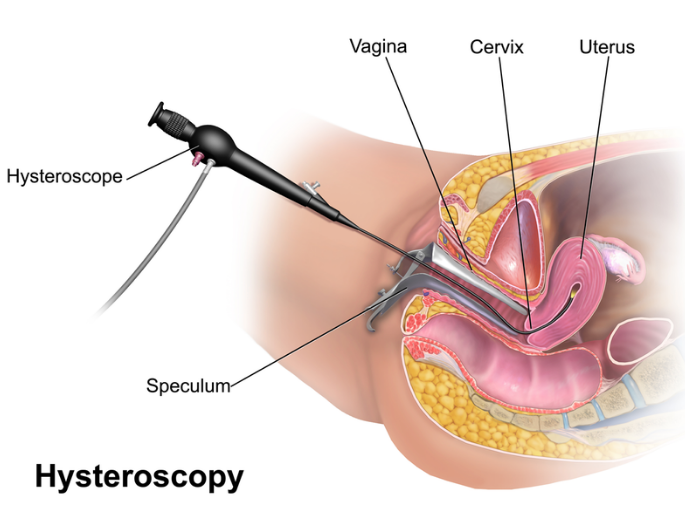Hysteroscopy in Cyprus
Search and Compare the Best Clinics and Doctors at the Lowest Prices for Hysteroscopy in Cyprus

Find the best clinics for Hysteroscopy in Cyprus
No clinics available
Morocco offers the best prices Worldwide
Price: $ 222

- Home
- Cyprus
WHY US?
At Medijump, we're making medical easy. You can search, compare, discuss, and book your medical all in one place. We open the door to the best medical providers worldwide, saving you time and energy along the way, and it's all for FREE, no hidden fees, and no price markups guaranteed. So what are you waiting for?

Free

Best Price

Widest Selection

Risk-Free
What you need to know about Hysteroscopy in Cyprus

Hysteroscopy is a procedure that allows a doctor to examine the inside of a woman’s cervix and uterus in order to diagnose and treat issues, such as pelvic pain, difficulty getting pregnant and abnormal bleeding. It is performed using a thin and flexible tube with a camera and a light at the end called a hysteroscope, which will send an image to a monitor so your doctor can get an up-close look inside your cervix and uterus.
What does a Hysteroscopy Procedure Involve?
Hysteroscopy can be performed under local anaesthetic and sedative, but it can also be done under general anaesthetic. Medication or tools called dilators are used to help open your cervix to allow the hysteroscope to be inserted. Then, a liquid solution or carbon dioxide gas is inserted through the hysteroscope into the uterus to clear away any blood or mucus and expand it, which will give your doctor a clear view of its lining. If surgery needs to be performed, the surgeon may do it during the procedure using tiny surgical instruments that are inserted through the hysteroscope.
How Long Should I Stay in Cyprus for a Hysteroscopy Procedure?
You may be able to leave the hospital several hours after the procedure. However, it is recommended to stay in Cyprus for around 2 to 3 days, especially if you had treatment during the procedure or if you received general anaesthetic as you will need to allow your body to rest for several days.
What's the Recovery Time for Hysteroscopy Procedures in Cyprus?
Most women are able to get back to work as well as their normal activities the day after the procedure. But, you may want to rest for a few days if a general anaesthetic was used or treatment was performed during your hysteroscopy. Note that you need to avoid sex for around 2 weeks after the procedure.
What sort of Aftercare is Required for Hysteroscopy Procedures in Cyprus?
You may experience cramping and bleeding, but you can take pain medication and wear pads to deal with this. If the result of your hysteroscopy shows any disease or abnormalities, you may want to schedule a follow-up appointment with your doctor in Cyprus or with your local doctor at home to discuss a treatment plan.
What's the Success Rate of Hysteroscopy Procedures in Cyprus?
Hysteroscopy is a highly successful and effective procedure to examine your uterus and cervix. Nonetheless, there is still a small chance that the result is inaccurate, but it is very rare. Also, there are some side effects and complications to be aware of, including infection, tearing or damage to the cervix, damage to nearby organs, pelvic inflammatory disease, problems with gas or fluid from the uterus, and problems with the anaesthetic.
Are there Alternatives to Hysteroscopy Procedures in Cyprus?
The alternatives to hysteroscopy are pelvic ultrasound and endometrial biopsy. These procedures can be performed alongside a hysteroscopy, but they do not provide as much information as a hysteroscopy.
What Should You Expect Before and After the Procedure
Before hysteroscopy, you may have an unknown condition in your uterus or cervix, which may be dangerous and life-threatening. After the procedure, you will find out what is causing the symptoms and you can discuss with your doctor the best treatment plan.
Whilst the information presented here has been accurately sourced and verified by a medical professional for its accuracy, it is still advised to consult with your doctor before pursuing a medical treatment at one of the listed medical providers
No Time?
Tell us what you're looking for and we'll reachout to the top clinics all at once
Enquire Now

Popular Procedures in Cyprus
Prices Start From $106

Prices Start From $131

Prices Start From $47

Recommended Medical Centers in Cyprus for procedures similar to Hysteroscopy

- Interpreter services
- Translation service
- Religious facilities
- Medical records transfer
- Medical travel insurance
- Health insurance coordination
- TV in the room
- Safe in the room
- Phone in the room
- Private rooms for patients available

- Interpreter services
- Translation service
- Religious facilities
- Medical records transfer
- Medical travel insurance
- Health insurance coordination
- TV in the room
- Safe in the room
- Phone in the room
- Private rooms for patients available

- Interpreter services
- Translation service
- Religious facilities
- Medical records transfer
- Medical travel insurance
- Health insurance coordination
- TV in the room
- Safe in the room
- Phone in the room
- Private rooms for patients available

- Interpreter services
- Translation service
- Religious facilities
- Medical records transfer
- Medical travel insurance
- Health insurance coordination
- TV in the room
- Safe in the room
- Phone in the room
- Private rooms for patients available
Hysteroscopy in and around Cyprus
Cyprus is an island country in the Mediterranean Sea. The country is famous for its mineral wealth, splendid wines, dazzling beaches, and compelling culture. In addition, Cyprus is filled with classical ruins and century-old monasteries, and as the legendary birthplace of Aphrodite, it is also steeped in mythology. Due to its huge array of modern private medical centers equipped with excellent service, cutting-edge technology, and skilled doctors, Cyprus is also a thriving medical tourism destination. Foreign patients from all around the globe come to this country for a vast range of medical treatments, particularly bariatric surgery, cardiology, cosmetic and plastic surgery, and fertility treatments. Its spa and well-being resorts are also welcoming an increasing number of international medical tourists.
Popular Parts of Cyprus
The majority of tourists start their trip to Cyprus in Larnaca, it is the oldest city in Cyprus. It has a vast array of historical monuments, including Ayios Lazaros (the Church of Saint Lazarus), Stavrovouni Monastery, and Larnaca Medieval Castle. Besides its ancient buildings, Mackenzie Beach and Larnaca Marina are also popular among tourists. Not too far from Larnaca is Paphos, a charming city with exquisite natural beauty and all sorts of ancient ruins. The most popular attractions in this city include the Tombs of the Kings, the Old Town, Early Christian Basilica-St Paul’s Pillar, and Paphos UNESCO Archaeological Park. Nicosia, Cyprus’ capital, is also a popular destination.
Weather and Climate in Cyprus
Cyprus experiences a Mediterranean climate with four seasons and over 300 days of sunshine a year. The summer is long, warm, and dry, lasting from mid-May to mid-October. The winter starts in December and ends in February, bringing mild temperatures and more rain showers. Autumn and spring are short, but there is good weather.
Getting around in Cyprus
The main international gateway to Cyprus is Larnaca International airport. It serves international flights to many cities around Europe and the Middle East, including Kyiv, Abu Dhabi, London, and Moscow. In the south, the intercity bus system is reliable and great, but in the north, the bus services are often unreliable and do not seem to follow a timetable. Taxis are a safe and relatively inexpensive option. In the south, there are three types of taxi services: urban, trans-urban or interurban (shared and can be booked), and rural. In the north, taxis are only available in the main towns. Inside towns, buses are the best way to get around for those looking for a more affordable option. Taxis are more expensive, but they do offer more flexibility.
Tourist Visas in Cyprus
Nationals of EU countries, the United States, Australia, Canada, Britain, Iceland, Japan, and several other countries do not need a visa to visit and stay in Cyprus for up to 90 days. Other countries not listed in the visa-free agreement need to apply for a visa before entering Cyprus. It is best to consult the Cypriot Ministry of Foreign Affairs or contact the embassy to learn more about visa requirements.
Additional Information
- Local Currency: The euro (€) has been the official currency of Cyprus since 1 January 2008. The exchange rate from €1 is approximately US$1.17.
- Money & Payments: It is easy to find reliable ATMs in large towns and tourist areas. Major credit cards, such as Visa and MasterCard, are widely accepted in larger restaurants, shops, and hotels. However, if you plan to go to smaller towns or villages, it is best to ensure you have cash. Tipping is expected most of the time. Tip at least 10% of the bill, and at least 5% or round up to the nearest euro for taxi drivers.
- Local Language: Around 80% of Cypriots speak Greek as their first language, while Turkish is spoken by 10% of the population. English is widely spoken, especially in tourist areas.
- Local Culture and Religion: The main religion of Cyprus is Greek Orthodox, but Islam is the most prominent religion in the north.
- Public holidays: Some of the most celebrated holidays in Cyprus include Ohi Day, Christmas Day, Boxing Day, New Year’s Day, Epiphany, Clean Monday, Cyprus National Day, and Independence Day.
Popular Searches
- Plastic Surgery in Thailand
- Dental Implants in Thailand
- Hair Transplant in Thailand
- Breast Augmentation Thailand
- Gastric Sleeve in Thailand
- Gender Reassignment Surgery in Thailand
- Laser Hair Removal in Bangkok
- Botox in Bangkok
- Dermatology in Bangkok
- Breast Augmentation in Bangkok
- Coolsculpting in Bangkok
- Veneers in Turkey
- Hair Transplant in Turkey
- Rhinoplasty in Turkey
- Stem Cell Therapy in Mexico
- Rhinoplasty in Mexico
- Liposuction in Mexico
- Coolsculpting in Tijuana
- Rhinoplasty in Korea
- Scar Removal in Korea
- Gastric Sleeve in Turkey
- Bone Marrow Transplant in India
- Invisalign in Malaysia
- Plastic Surgery in the Dominican Republic
- Tummy Tuck in the Dominican Republic
- Plastic and Cosmetic Surgery in Poland
- Rhinoplasty in Poland
- Hair Implant in Poland
- Dental Implants in Poland
- IVF in Turkey